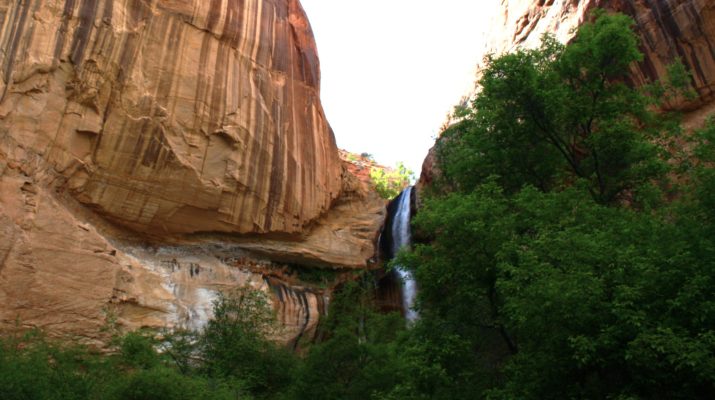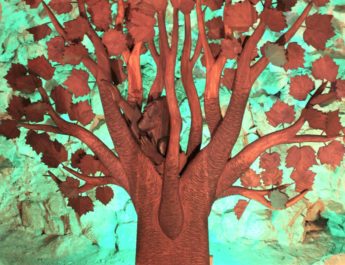Exodus 17:1-7
Third Sunday in Lent A
1 From the wildernessA of SinB the wholeC congregationD
A “wilderness” = midbar. From dabar (to speak, command, declare). This is mouth or speech. It can also be desert or wilderness. Additionally, it can be used for a pasture to which one drives cattle.
B “Sin” = Sin. 6x in OT. Perhaps from asam (to gather, store) OR from seneh (thorn bush) OR related to Aramaic siyn (a god called Sin) OR perhaps Hebrew siyn (related to mud or clay). This is Sin, the name of a city. It may mean, “clay” or “bush.” See https://www.abarim-publications.com/Meaning/Sinai.html
C “whole” = kol. From kalal (to complete). This is all or every.
D “congregation” = edah. From yaad (to appoint, assemble or gather selves, agree) OR from ed (witness, testimony, recorder); from ud (to admonish, repeat, duplicate, testify, restore, record, relieve). This is a congregation, assembly, or company. It could be a family, crowd, or fixture.
of the IsraelitesE journeyedF by stages,G as the Lord commanded.H
E “Israelites” = ben + Yisrael. Literally, “children of Israel.” Ben is from banah (to build or obtain children). This is son, age, child. It is son in a literal or figurative sense. Yisrael is from sarah (to persist, exert oneself, contend, persevere, wrestle, prevail) + el (God or god). This is Israel, meaning God strives or one who strives with God; new name for Jacob and for his offspring. This refers to the people and to the land.
F “journeyed” = nasa. This is properly pulling up as when one pulls up tent pegs or stakes. This would imply striking tents in order to start a journey. So this could be bring, pullout, set out, journey, or cause to go away.
G “stages” = massa. Related to “journeyed” in v1. 12x in OT– all in the first five books of the Bible. From nasa (see note F above). This is a departure, striking camp, travelling by stages a station or march.
H “as the Lord commanded” = al + peh + YHVH. Literally, “according to the mouth of the Lord.” Peh is mouth in a literal or figurative sense. So, more literally, it can be beak or jaws. More figuratively, it refers to speech, commands, or promises. YHVH is from havah (to be, become) or hayah (to come to pass, become, be). This is the name of the God of Israel, the self-existent and eternal one, the tetragrammaton. This pronunciation has been lost to time so “Lord” is generally used in its place.
They campedI at Rephidim,J but there was no waterK for the peopleL to drink.M
I “camped” = chanah. This is decline, bending down, or living in tents. It can be camping to create a home or camping as a part of battle.
J “Rephidim” = Rephidim. 5x in OT. From raphad (to spread, make a bed, refresh, comfort). This is Rephidim, meaning supports.
K “water” = mayim. This is water, waters, or waterway in a general sense. Figuratively, it can also mean juice, urine, or semen.
L “people” = am. From amam (to darken, hide, associate; creating shadows by huddling together). This is people or nation. It can be used specifically for a tribe, collectively of troops or armies, or figuratively to refer to a flock of animals.
M “drink” = shathah. This is to drink literally or figuratively. It could also be a drinker.
2 The people quarreledN with Moses,O and said, “GiveP us water to drink.”
Moses said to them, “Why do you quarrel with me? Why do you testQ the Lord?”
N “quarreled” = rib. This is properly to toss or grapple. It is used figuratively to mean wrangling and so for arguments, complaints, or disputes. It is used in a legal setting for pleading or defending a case.
O “Moses” = Mosheh. From mashah (to pull out in a literal or figurative sense, to draw out) OR from Egyptian mes or mesu (child, son i.e. child of…). This is Moses – the one drawn out from the water, which is to say, rescued. If derived from the Egyptian, his name would share a root with Rameses and Thutmose.
P “give” = natan. This is to give, put, set, offer. It is to give literally or figuratively.
Q “test” = nasah. This is to test, prove, try, tempt, or attempt.
3 But the people thirstedR there for water; and the people complainedS against Moses and said, “Why did you bringT us out of Egypt,U
R “thirsted” = tsame. 10x in OT. This is to thirst in a literal or figurative sense.
S “complained” = lun. This is to stop – usually to lodge for the night. It can imply dwelling, enduring, or staying permanently. Figuratively, it can mean being obstinate, particularly with one’s words – to complain.
T “bring” = alah. This is to go up, approach, ascend, be high, be a priority; to arise in a literal or figurative sense.
U “Egypt” = Mitsrayim. Perhaps from matsor (besieged or fortified place, bulwark, entrenchment; something hemmed in; a siege or distress or fastness); from tsur (to confine, besiege, to cramp). This is Egypt.
to killV us and our childrenW and livestockX with thirst?”Y
V “kill” = mut. This is to die in a literal or figurative sense. It can also refer to being a dead body.
W “children” = ben. Same as “Israelites” in v1. See note E above.
X “livestock” = miqneh. From qanah (to get, acquire, purchase, move to jealousy, buyer, keep cattle). This is something that is bought, which implies property or possession. However, it is generally used of livestock – cattle, flock, herds.
Y “thirst” = tsama. Related to “thirsted” in v3. 17x in OT. From tsame (see note R above). This is thirst in a literal or figurative sense. It could also refer to dry ground.
4 So Moses cried outZ to the Lord, “What shall I doAA with this people? They are almostBB ready to stoneCC me.”
Z “cried out” = tsaaq. This is to cry out or call together, to shriek. It can mean, by implication, calling for an assembly.
AA “do” = asah. This is to make, do, act, appoint, become in many senses.
BB “almost” = me’at. From ma’at (being or becoming small, decrease, diminish, pare off). This is a little or few, lightly little while, very small matter.
CC “stone” = saqal. Properly, this means being weighty. However, it is used for stoning someone (to death) or for removing stones.
5 The Lord said to Moses, “Go onDD aheadEE of the people, and takeFF some of the eldersGG of Israel with you;
DD “go on” = abar. This is to pass over or cross over. It is used for transitions, whether literal or figurative. It can also mean to escape, alienate, or fail. This is the root verb from which “Hebrew” is drawn.
EE “ahead” = paneh. From panah (to turn, face, appear). This is face in a literal or figurative sense. It could be face, presence, anger, respect. It can also be used of God to indicate divine favor or presence.
FF “take” = laqach. This is to take, accept, carry away, receive. It can also have the sense of take a wife or take in marriage.
GG “elders” = zaqen. From the same as zaqan (beard or chin – the beard represents old age). This is old, aged, or elder.
take in your handHH the staffII with which you struckJJ the Nile,KK and go.LL
HH “hand” = yad. This is hand, ability, power. Hand in a literal sense, but also what one can do or the means by which one does it.
II “staff” = matteh. From natah (to stretch or spread out, extend, bend). This is a staff, rod, branch, or tribe. It could be a rod for discipline or correction. It could be a scepter to indicate authority, a throwing lance, or a walking staff. Figuratively, it could also be something that supports life (like bread).
JJ “struck” = nakah. This is to hit whether lightly or severely. It can be used in a literal or figurative sense. So, this could be beat, punish, give wounds, kill, or slaughter.
KK “Nile” = Yeor. From Egyptian yeor (river). This is the Nile as the main river in Egypt. It is also used for the Tigris for its similar status in Assyria. It can also more generally mean river, steam, channel, or flood.
LL “go” = halak. This is go, come, walk. It is walk literally and figuratively and includes people and animals. It can be used figuratively for one’s moral life – how we walk according to God’s way or against it. It can also refer to the walk of life as in the course one’s life takes, the choices we make, etc.
6 MMI will be standingNN there in front ofOO you on the rockPP at Horeb.QQ Strike the rock, and water will comeRR out of it, soSS that the people may drink.” Moses did so, in the sightTT of the elders of Israel.
MM {untranslated} = hen. This is a remark of surprise or excitement: lo! Behold! It can also mean if or though.
NN “standing” = amad. This is to stand up in a literal or figurative sense. So it can be establish, continue, endure, take a stand, act, be a servant, stand still, remain, stand against an enemy.
OO “in front of” = paneh. Same as “ahead” in v5. See note EE above.
PP “rock” = tsur. Perhaps related to “Egypt” in v3. Perhaps from tsur (see note U above). This is rock, stone, cliff, boulder, rocky. It can also be a refuge, a way to refer to God.
QQ “Horeb” = Choreb. 17x in OT. From chareb (to devastate, desolate, or be waste). Horeb means waste or desolate.
RR “come” = yatsa. This is to go or come out, bring forth, appear. It is to go out in a literal or figurative sense.
SS “so” = ken. Perhaps from kun (properly, in a perpendicular position; literally, to establish, fix, fasten, prepare; figuratively, it is certainty, to be firm, faithfulness, render sure or prosperous). This is to set upright. Generally used figuratively to mean thus, so, afterwards, rightly so.
TT “sight” = ayin. This is eye in a literal or figurative sense so eye, appearance, favor, or a fountain (the eye of the landscape).
7 He calledUU the placeVV MassahWW and Meribah,XX because the Israelites quarreledYY and tested the Lord, saying, “Is the Lord amongZZ us or not?”
UU “called” = qara + shem. Qara is to call or call out – to call someone by name. Also used more broadly for calling forth. Shem may be from sum (to put, place, set). This is name, fame, renown. A name was thought to indicate something essential about a person – something about their individuality. So, this word can also mean honor, authority, or character.
VV “place” = maqom. From qum(to arise, stand, accomplish, establish, abide; rising against, getting up after being sick or asleep, arising from one state to another, becoming powerful, or rising for action; standing in a figurative sense). This is a standing, which is to say a spot or space a place. It can also refer to a locality or a physical/mental condition. HaMaqom is also a Jewish name for God – the place, i.e. the Omnipresent One.
WW “Massah” = Massah. Related to “test” in v2. 4x in OT. From nasah (see note Q above). This is Massah, a place whose name means “test” or “proving” or “temptation.” See https://www.abarim-publications.com/Meaning/Massah.html
XX “Meribah” = Meribah. Related to “quarreled” in v2. 6x in OT. From the same as meribah (strife, quarrel); from rib (see note N above). This is Meribah, a place whose name means “strife” or “quarrel” or “chiding.” See https://www.abarim-publications.com/Meaning/Meribah.html
YY “quarreled” = rib. Related to “quarreled” in v2 & “Meribah” in v7. From rib (see note N above). This is strife or dispute – whether a personal one or one in a court of law.
ZZ “among” = qereb. Perhaps from qarab (to come near or approach). This is among, in the midst, before, the center It is the inward part, whether literal or figurative. It can also be used for the heart, the site of thoughts and feelings. This word is also used as a technical term for the entrails of the animals who are sacrificed.
Image credit: “Lower Calf Creek Falls” in Utah by The Dye Clan, 2011.




